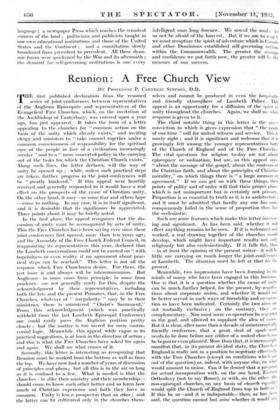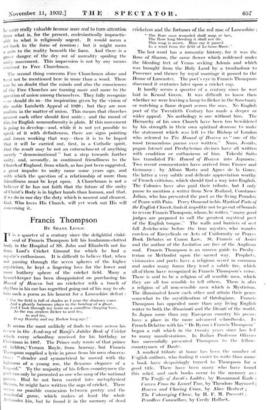Reunion : A Free Church View
.13Y PROFESSOR P. CARNEGIE SIMPSON, D.D.
THE first published declaration from the resumed series of joint-conferences between representatives of the Anglican Episcopate and representatives of the- Evangelical Free Churches, which, on the invitation of the Archbishop of Canterbury, was entered upon a year ago, has just appeared. It takes the form of a letter appealing to the churches for " common action on the basis of the unity which already exists," and inviting clergy and ministers to " take counsel together under a common consciousness of responsibility for the spiritual care of the people in face of a civilization increasingly secular " and to a " more concerted policy in the carrying out of the tasks for which the Christian Church exists." Along such lines, the letter declares, will the way of unity be opened up ; while, unless such practical steps are taken, further progress in the joint-conferences will be " greatly hindered." If this appeal were heartily received and generally responded to it would have a real effect on the prospects of the cause of Christian unity.
On the other hand, it may—as some fear and others hope —come to nothing. In any case, it is in itself significant, and it is desirable that its significance be appreciated. Three points about it may be briefly noted.
In the first place, the appeal recognizes that the dis- cussion of unity must be accompanied by acts of unity.
This the Free Churches have been saying ever since these joint-conferences first opened, more than ten years ago; and the Assembly of the Free Church Federal Council, in reappointing its representatives this year, declared that the Lambeth conversations could not be carried on " with hopefulness or even reality if no agreement about prac- tical steps can be reached." This letter is not all the response which Free Churchmen desire. For them, the test issue is and always will be intercommunion. But Anglicans—in some cases from principle, in some from prudence—are not generally ready for this, despite the acknowledgment by their representatives, including both the late and the piesent Primates, that, in the Free Churches, whatever of " irregularity " may be in their ministries, there is ministered " Christ's Sacrament." From this acknowledgment (which was practically withheld from the last Lambeth Episcopal Conference) one could easily press the Anglican position pretty closely ; but the matter is too sacred for mere contro- versial logic. Meanwhile, this appeal, while vague in its practical suggestions, is at least in the direction of action ; and this is what the Free Churches have asked for again and again. We shall see what comes of it.
Secondly, this letter is interesting as recognizing that Reunion must be worked from the bottom as well as from the top. We have now had a number of years of discussion of principles and plans ; but all this is in the air so long as it is confined to a few. What is needed is that the churches—in alike their ministry and their membership— should come to know each other better and so learn how much of Christian experience and faith they have in common. Unity is less a prospectus than an ethos ; and the latter can he cultivated only in the churches them- selves and cannot be•-produced - in even--the hospitable and friendly atmosphere of Lambeth Palaee. This appeal is an opportunity for a diffusion of the spirit of unity throughout the Churches.' Again,, we shall see what response is given to it. - The third notable thing in this letter is the grave conviction to which it gives expression that " the needs of our time " call for united witness and service. This is surely right ; and it is significant and welcome that it is growingly felt among the younger representatives both of the Church of England and of the Free Churches.
The vital questions for religion to-day are not about episcopacy or ordination, but are, as this appeal says.
" about the message of the gospel, about the contents of the Christian faith, and about the principles of Christian morality," on which things there is " a large measure of agreement." If we can get on with these things, then points of polity and of order will find their proper place, which is not unimportant but is certainly not primary. Proportion is as essential to truth as it is to architecture ; and it must be admitted that hardly any one has more conspicuously failed in the sense of proportion than has the ecclesiastic.
Stich are some features which make this letter interest- ing and significant. As has been said, whether it will effect anything remains to be seen. If it is welcomed and worked, a real drawing together of the churches would develop, which might have important results not only religiously but also ecclesiastically. If it falls flat, then —in at least the opinion of the present writer—it will Ix- little use carrying on much longer the joint-conferences at Lambeth. The situation must be left at that for the present.
Meanwhile, two impressions have been forming in the minds. of many who hive been engaged in this business. One is that it is a question whether the cause of unity can be much further helped, for the present, by negotia- tions about corporate union, and whether it would not be better served in such ways of friendship and co-opera- tion as have been indicated. _ Certainly the two aims are not mutually exclusive ; on the contrary, they are complementary. Nor-must mere co-operation be regarded as the goal, and allowed to supplant the idea of union. But it is clear, after more than a decade of uninterruptedly friendly conference, that a great deal of spade-work needs to be done before any edifice of a united church can be begun or even planned. More than that, it is increasingly manifest that, in its present divided state,-• the:Chureli 01. England is really not in a position to negotiate effectively with the Free Churches- (except on conditions which are out of the question) or, indeed, with anyone else, on what would amount to union. • Can it be denied that a proposal for actual incorporation with, on the one hand; Fasten) Orthodoxy (not to say Rome), or with, on the other, the non-episcopal churches, on any basis of church equality would split the Church 'Of England from top to bottom If this be so—and it is-indisputable—then; -as has said, the question cannot but arise whether would not be more really valuable-because more real to turn Attention from what 1S,. for the present, ecclesiastically impractic- able to..what‘is ,religiously urgent.: would -mean a set-haek. to the form- of reunion ; but it might mean a gain to the reality beneath the Jorm. And there. is a grave danger; of the: dry. rot of unreality spoiling the unity movement. This impression is not by any means confined to Free Churchmen.
The second thing concerns Free Churchmen alone and heed not be mentioned. here in more than a word. There ean be no doubt that the minds and also the consciences of the Free Churches. arc turning more and more to the question of.union among themselves. They fully recognize —or should :do Sa—the inspiration given-by the vision of the noble .Latnbeth Appeal of. 1920 ; :but they are now realists in the matter of union. This means that churches nearest each 'other should first unite.; and the moral of this for English nonconformity. is plain. If this movement is going-to develop-and, while it is not yet possible to speak of it. with definiteness, there are signs pointing and forces. working -that way—then it is to be hoped that it will be carried out, first, in a Catholic spirit, that the result may be not an entrenchment of anything merely " denominational " but a step towards further unity, and, secondly,- in continued, friendliness to the Church of England, from which, as has just been suggested. a great impulse to unity came some years. ago, and with which the question of a relationship of more than friendliness niusthe• kept open. A Churchman is not a believer if he has not faith that the future of the unity of Christ's Body-is in higher hands than human, and that. if we do in our day-the duty which is nearest and clearest. Cod. Who loves His Church, will yet work out His will concerning it.































 Previous page
Previous page